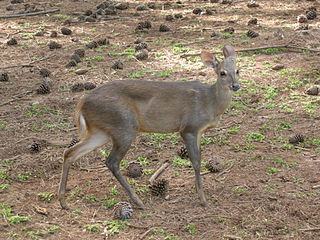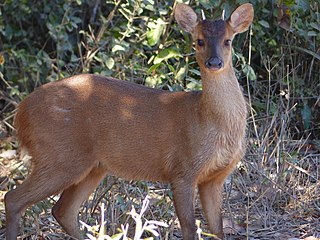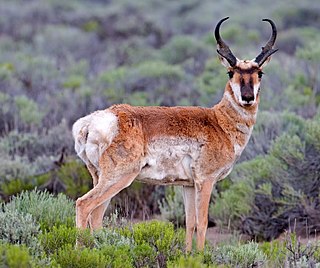Related Research Articles
A calendar date is a reference to a particular day represented within a calendar system. The calendar date allows the specific day to be identified. The number of days between two dates may be calculated. For example, "25 November 2022" is ten days after "15 November 2022". The date of a particular event depends on the observed time zone. For example, the air attack on Pearl Harbor that began at 7:48 a.m. Hawaiian time on 7 December 1941 took place at 3:18 a.m. Japan Standard Time, 8 December in Japan.

Pseudomonadota is a major phylum of Gram-negative bacteria. The renaming of phyla in 2021 remains controversial among microbiologists, many of whom continue to use the earlier names of long standing in the literature. The phylum Proteobacteria includes a wide variety of pathogenic genera, such as Escherichia, Salmonella, Vibrio, Yersinia, Legionella, and many others. Others are free-living (nonparasitic) and include many of the bacteria responsible for nitrogen fixation.
Pax Americana is a term applied to the concept of relative peace in the Western Hemisphere and later in the world after the end of World War II in 1945, when the United States became the world's dominant economic and military power.

Encyclopedia Americana is a general encyclopedia written in American English. It was the first major multivolume encyclopedia that was published in the United States. With Collier's Encyclopedia and Encyclopædia Britannica, Encyclopedia Americana became one of the three major English-language general encyclopedias: The three were sometimes collectively called "the ABCs". Following the acquisition of Grolier in 2000, the encyclopedia has been produced by Scholastic.

The Boletales are an order of Agaricomycetes containing over 1300 species with a diverse array of fruiting body types. The boletes are the best known members of this group, and until recently, the Boletales were thought to only contain boletes. The Boletales are now known to contain distinct groups of agarics, gasteromycetes, and other fruiting-body types.

Agave americana, common names century plant, maguey, or American aloe, is a species of flowering plant in the family Asparagaceae, native to Mexico and the United States in Texas. It is cultivated worldwide as an ornamental plant, and has been naturalized in many regions, including parts of the West Indies, South America, Mediterranean Basin, Africa, Canary Islands, India, China, Thailand, and Australia.
Xanthomonadaceae is a family of Pseudomonadota within the Xanthomonadales order. It was previously known as Lysobacteraceae.

Brockets or brocket deer are the species of deer in the genus Mazama. They are medium to small in size, and are found in the Yucatán Peninsula, Central and South America, and the island of Trinidad. Most species are primarily found in forests. They are superficially similar to the African duikers and the Asian muntjacs, but unrelated. About 10 species of brocket deer are described.

The red brocket is a species of brocket deer from forests in South America, ranging from northern Argentina to Colombia and the Guianas. It also occurs on the Caribbean island of Trinidad.

Saccharomycetales belongs to the kingdom of Fungi and the division Ascomycota. It is the only order in the class Saccharomycetes. There are currently 13 families recognized as belonging to Saccharomycetales. GBIF also includes; Alloascoideaceae, Eremotheciaceae (16) Trigonopsidaceae and Wickerhamomycetaceae.

The Americana at Brand is a large shopping, dining, entertainment and residential complex in Glendale, California. The property was built and is owned and operated by Los Angeles businessman Rick J. Caruso and his company Caruso Affiliated. Caruso Affiliated has built and operates many other projects, including The Grove at Farmers Market in Los Angeles. The Americana at Brand's 82 retail shops include Barneys New York, Nordstrom, XXI Forever, and David Yurman; its restaurants include Din Tai Fung, Bourbon Steak by Michael Mina, and Katsuya; the complex comprises 100 condominiums and 242 luxury apartments.

The pronghorn is a species of artiodactyl mammal indigenous to interior western and central North America. Though not an antelope, it is known colloquially in North America as the American antelope, prong buck, pronghorn antelope and prairie antelope, because it closely resembles the antelopes of the Old World and fills a similar ecological niche due to parallel evolution. It is the only surviving member of the family Antilocapridae.
The Chloroflexota are a phylum of bacteria containing isolates with a diversity of phenotypes, including members that are aerobic thermophiles, which use oxygen and grow well in high temperatures; anoxygenic phototrophs, which use light for photosynthesis ; and anaerobic halorespirers, which uses halogenated organics as electron acceptors.

Sudamérica Rugby, is the governing body for rugby union within South America and most of Central America. It was created on 14 October 1988 in Asunción on the initiative of Argentina, Brazil, Chile, Paraguay, and Uruguay, counting with a total of 16 unions.
The Negativicutes are a class of bacteria in the phylum Bacillota, whose members have a peculiar cell wall with a lipopolysaccharide outer membrane which stains gram-negative, unlike most other members of the Bacillota. Although several neighbouring Clostridia species also stain gram-negative, the proteins responsible for the unusual diderm structure of the Negativicutes may have actually been laterally acquired from Pseudomonadota. Additional research is required to confirm the origin of the diderm cell envelope in the Negativicutes.
The Selenomonadales are an order of bacteria within the class Negativicutes; unlike most other members of Bacillota, they are Gram-negative. The phylogeny of this order was initially determined by 16S rRNA comparisons. More recently, molecular markers in the form of conserved signature indels (CSIs) have been found specific for all Selenomonadales species. On the basis of these markers, the Selenomonadales are inclusive of two distinct families, and are no longer the sole order within the Negativicutes. Several CSIs have also been found specific for both families, Sporomusaceae and Selenomonadceae. Samples of bacterial strains within this order have been isolated from the root canals of healthy human teeth.
Purdue Improved Crop Storage (PICS) bags provide a simple, low-cost method of reducing post-harvest cowpea losses due to bruchid infestations in west and central Africa. Bags have been demonstrated to be effective for several other crops.
The Natranaerobiales are an order of bacteria placed within the class Clostridia. This order contains the thermophilic bacterial species Natranaerobius thermophilus and the related species Natranaerobaculum magadiense.
Thermolithobacteria is a class of rod-shaped Gram-positive bacteria within phylum Bacillota. Species within this class are thermophilic lithotrophs isolated from sediment in Calcite Springs in Yellowstone National Park. Thermolithobacter ferrireducens strain JW/KA-2(T) metabolism consists of the oxidation of hydrogen gas and reduction of ferric oxide to magnetite. Thermolithobacter carboxydivorans strain R1(T) is hydrogenic and oxidizes carbon monoxide.
The Coriobacteriia are a class of Gram-positive bacteria within the Actinomycetota phylum. Species within this group are nonsporulating, strict or facultative anaerobes that are capable of thriving in a diverse set of ecological niches. Gordonibacter species are the only members capable of motility by means of flagella within the class. Several species within the Coriobacteriia class have been implicated with human diseases that range in severity. Atopobium, Olsenella, and Cryptobacterium species have responsible for human oral infections including periodontitis, halitosis, and other endodontic infections. Eggerthella species have been associated with severe blood bacteraemia and ulcerative colitis.
References
- ↑ Kerrigan J, Smith M Th, Rogers J, Poot GA (2001). "Ascobotryozyma americana gen. nov. et sp. nov. and its anamorph Botryozyma americana, an unusual yeast from the surface of nematodes". Antonie van Leeuwenhoek. 79 (1): 7–16. doi:10.1023/A:1010287612965. PMID 11392486.
- ↑ Lumbsch TH, Huhndorf SM (December 2007). "Outline of Ascomycota – 2007". Myconet. Chicago, USA: The Field Museum, Department of Botany. 13: 1–58. Archived from the original on 2009-03-18.